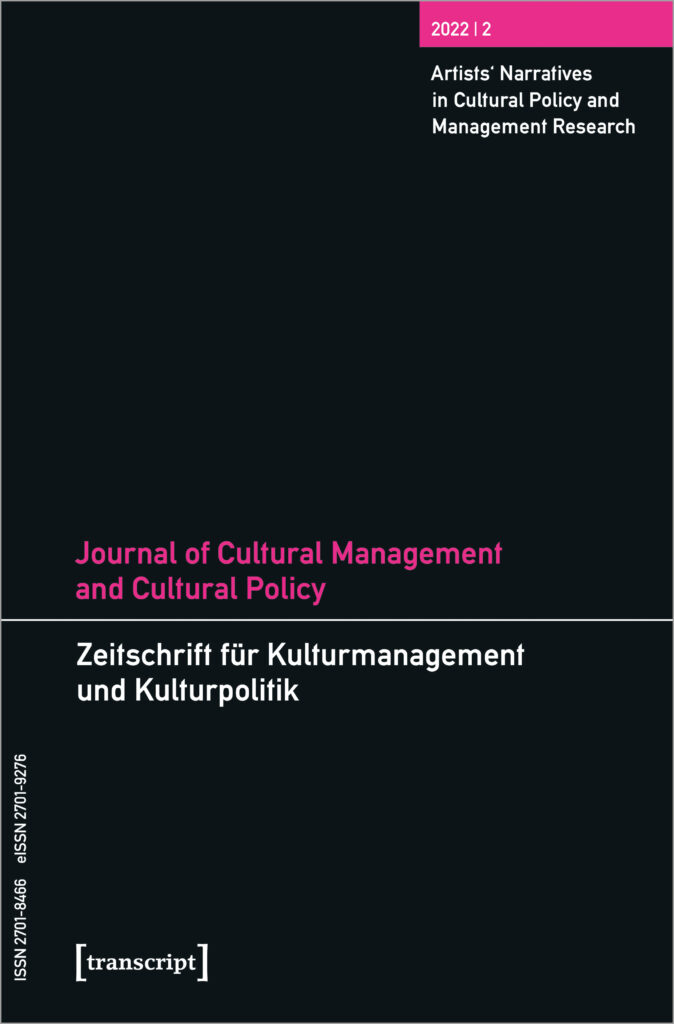Research Article
The Devaluation of the artist
Abstract
Much has been written about artists’ precarity and dependency on institutions. Precarity is a de-economisation of freelance artists and ‘asymmetry’ on which cultural economy and arts policy relies. Speculation early in 2020 was that Covid-19 drew attention to the unethicality of these relationships but what has changed? Here, pre-pandemic and rapid response research on UK freelance theatre artists are brought together to suggest that the #CultureReset has been little more than a resetting of the stage with all props and players returning to previous positions.
Pre-pandemic, the separation of artists from the language, policymaking, business and decision-making of professional subsidised theatre represented an unethical rationality. Covid-19 interrupted and transformed all cultural activity with a disproportionate impact on freelance artists, particularly in performing arts. Yet during 2020 and 2021, previous value systems (the rationality of the field) were maintained. Early hopes for improved conditions diminish as institutions and governments restore previous behaviours, counter to the ‘new normal’ advocated. A global crisis could not change the ‘value problem’ of artists in the arts. Moreover, pity procured for artists during the pandemic has further infantilised and devalued them. These findings call for greater scrutiny of the ethics of arts management and policy and new more collaborative approaches to solving the value problem.
Keywords
2022 (2)
Artists' Narratives in Cultural Policy and Management Research

Related Articles
Intangible Cultural Heritage, Sustainable Development, and the Integrating Role of Music
Journal of Cultural Management and Cultural Policy
Research Article
Divergences and convergences between education and cultural policies in Catalonia 1980-2010
Journal of Cultural Management 2016 (1)
Case Study
Theatre leadership from a communication perspective
Journal of Cultural Management 2019 (2)
Research Article
Art and Culture as an Urban Development Tool
A Diachronic Case StudyJournal of Cultural Management 2016 (1)
Research Article
Kulturpolitik und Kulturmanagement
Überlegungen zu einer PolitikfeldanalyseYearbook for Culture Management 2010
Research Article
Crisis of succession: On the institutionalization of charismatic rule in German theatre
Journal of Cultural Management 2019 (2)
Research Article
© 2026, Journal of Cultural Management and Cultural Policy
Keywords
- Aesthetics
- Higher Education
- Cultural Diplomacy and Foreign Cultural Policy
- Occupation
- Career and Professional Role
- Audience Development
- Audience Studies and Visitor Studies
- Visitor Motivations
- Business
- Covid Pandemic
- Democracy
- Digitalization
- Diversity
- Third Sector
- Empirical Aesthetics
- Development
- Ethics
- Evaluation
- Field Theory
- Festival
- Film
- Federalism
- Community Arts
- Societal Change
- Ideology
- Staging
- Career
- Communication
- Concert
- Creative Industries
- Creativity
- Crisis
- Culture
- arts organizations, cultural organizations
- Cultural Participation
- Cultural Change
- Fincancing The Arts
- Cultural Promotion Law
- Cultural History
- Cultural Management
- Cultural Economy
- Cultural Organizations
- Art Education
- Cultural Policy
- Cultural Production
- Cultural Sociology
- Art Education
- Cultural Understanding
- Arts Administration
- Cultural Industry
- Cultural Sciences
- Art
- Art Field
- Arts Research
- Artists
- Artistic Research
- Artistic Reputation
- Arts Management
- Arts Organizations
- Art education
- Arts Marketing
- Arts Administration
- Curating
- Leadership
- Literature
- Advocacy
- Management
- Marketing
- Market
- Media
- Methods Development
- Mexico
- Monumentalizing
- Museum
- Music
- Non-Visitor Studies
- Opera
- Orchestra
- Organization
- Political Expression
- Post-truth Politics
- Professional Role
- Audience
- Audience Development
- Law
- Government
- Role
- Socially Engaged Art
- Social Cohesion
- Social Change
- Social Cohesion
- Non-visitor Socio-demographics
- Socioculture
- State
- Symbolic capital
- Dance
- Participatory Justice
- Theatre
- Theatre Governance
- Theory Development
- Tourism
- Transformation
- Survey
- Entrepreneurship
- Urbanism
- Civil Society


